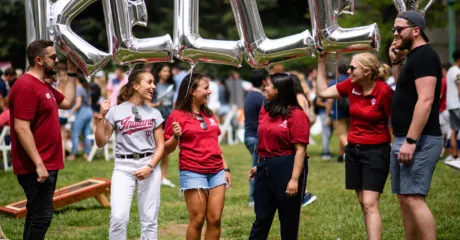The University of Virginia McIntire School of Commerce has consistently placed in the top 5 among all ranked undergraduate business schools. Virginia McIntire placed No. 4 for the second year in a row in this year’s 2023 ranking.
One of only a handful of elite two-year programs, students at Virginia begin with two years of liberal arts developing a well-rounded foundation of academic pursuits of their choice, mostly outside of business, before applying to the McIntire School of Commerce for entry in their third year. For example, 19% of student applicants are admitted into UVA as first-year students; at the end of their second year they apply for a spot in the School of Commerce, which admitted 53% of its internal UVA applicants for 2023.
Their average SAT score was nearly the same, just down one point on average, at 1417 compared to last year’s 1418. Of the three methodological categories, they scored best in Academic Experience – landing in the No.1 place.
Employment rates for McIntire were impressive, with 95.51% of the Class of 2023 securing full-time employment right after graduation, down just slightly from last year’s 97.83%. As for internships, their stats rose – with a solid 94% of the Class of 2023 securing at least one business-focused internship by the time of graduation – up from 93% for last year’s class.
THE INTEGRATED CORE CURRICULUM SETS
What makes Virginia McIntire a cut above most of its peers? A significant differentiator is in its curriculum, which is integrated across both traditional academic areas — accounting, IT, finance, management, and marketing — and supporting areas like global business, communication, analytics, and quantitative analysis. “This integration is operationalized in two key ways,” the school tells P&Q. “First, all students enroll in our unique Integrated Core curriculum during their first year in the program. The current Integrated Core involves 12 credit hours in the fall and 9 credit hours in the spring. Throughout both semesters, a team of seven faculty members teaches business fundamentals and students gain hands-on experience as they tackle real-world problems with our corporate partners.
“Second, in addition to the traditional concentrations (i.e., accounting, IT, finance, management, and marketing), each student has the opportunity in their second year in the program to enroll in a variety of interdisciplinary tracks, ranging from business analytics to real estate to global commerce.
“In sum, our students not only learn critical technical skills required for their first job, they also learn interdisciplinary skills that will be crucial as they advance in their respective organizations.”
The McIntire School continues to place a premium on digital innovation and globalization; in the former, it has introduced a number of new courses focused on contemporary topics, such as Artificial Intelligence, Big Data, Cloud Computing, Machine Learning, Cybersecurity, and Digital Innovation.
McIntire places a strong emphasis on global learning and offers students both on and off campus options, with a Global Commerce Track, a research-driven Global Commerce Scholars Program, a full range of semester-abroad options, and a host of faculty-led study-abroad courses.
Alumni say:
“The entire first semester at McIntire consisted of a consulting project in a case group for a major hospitality brand working on a real-world business issue, which culminated in us presenting our findings and recommendations to a board of executives at the company. We were able to leverage all of the classroom learning we’d absorbed in the courses of the semester (finance, marketing, management, communications, analytics) and really pin down which aspects we enjoyed the most, which was informative for the impending career search.”
“3rd year Integrated Core projects – semester long project that culminated in presentation to AB InBev pitching them on new opportunities for continued growth – important because it required a combination of directly relevant financial/analytical work alongside strong communication and presentation skills to a real outside audience. Also learned a lot about working in teams on projects with real-world application, and made some great friends along the way.”
“Our capstone course involved evaluating and presenting asset allocation recommendations for the university endowment to the university President and endowment CEO. Our small class (<10 kids) had extraordinary access to high-level decision makers, who mentored and guided our development. Not only did we diverge from traditional no-arbitrage pricing theory to understand the investment process from a practitioner’s perspective, but we formulated our own investment outlooks based upon research and current geopolitical environments to inform our recommendations. We came away from the experience with knowledge of the industry’s landscape, the players, the benefits (and risks) of various strategies, and the ability to articulate investment outlooks to an informed audience.”
“In the first year in the McIntire program, all students work towards a big final project in which we solve a business problem and present it to the company’s executives on the final day of the project. Not only did the project expose me to different aspects of business (marketing, valuation, advisory, etc.), communicating and coordinating with team members, we presented the case to the executives which taught me communications and public speaking skills.”
“Worked with a McIntire professor to develop a case study on several Charlottesville area craft breweries. The study applied the Material Flow Cost Accounting (MFCA) method onto their beer development processes to identify areas for cost and environmental savings. This experience prepared me incredibly well for my current Product Manager role — research, influencing without authority, developing a concept/models from scratch, etc.”










